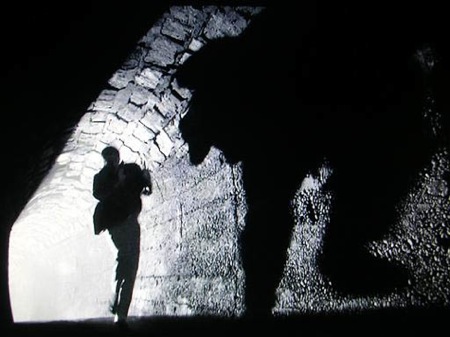
The Trial, 1962
Dir: Orson Welles
September 17, 2009
The Trial is an utterly effective experience. It's a really faithful adaptation (barring some up-to-date modernizations and the end), and some critics have noted that it is too faithful. François Truffaut, who felt that Welles was doing “a Kafka” in the same rather cold, reverent spirit with which a theater company might do “a Shakespeare,” was utterly unimpressed where he had been so reverential of Touch of Evil (1958) earlier. I think I agree. Where his Shakespeare films have a very distinct Welles feel, here it's sometimes hard to tell where it's Welles over Kafka in style. However, whatever your feelings about book-to-film adaptations, you can't help but be impressed by Welles' direction, which is awesome, as usual.

If you don't know the story, The Trial is about a man named Josef K (Anthony Perkins) who is arrested by a distant and abstract authority who does not make clear the charges brought against him. In his efforts to redeem his name, he goes to many different bizarre places and deals with many different confounding things, and by the end, even if you haven't read the novel, you know that Josef can't escape the tangled web he's been caught in.
Welles wanted this to be a black comedy, and Perkins plays off of that direction well, for at parts though you might want to laugh at the back-and-forth, circular conversations, you are right there with Josef being utterly baffled and frustrated by an authority that never gives any reasons for what they do or why they chose Josef. Perkins is a rather unorthodox Welles hero, but fitting for this film, and his confusion builds wonderfully through his awkward meetings with judges, women and painters.
Seeing as that many people consider "The Trial" the classic expressionist nightmare, Welles direction does a fantastic job of getting you lost in the maze. He balances long takes and long shots with just as many claustrophobic close-ups and rapid, uneasy cuts, imbuing the story with a feeling of loss, isolation, and perhaps freedom (if you look at it that way), as Josef's murder becomes imminent. The "flogging" scene in a store-room, which is probably the best in the film, feels entirely real and scary, and you, just like Josef, want desperately to get the hell out of there. Welles himself claimed that this was his best film, and as far as direction is concerned, you'd be hard pressed to disagree.

No comments:
Post a Comment